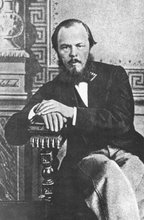 Dostoevsky has, in "Brothers Karamazov," mirrored the plot elements of Schiller’s "The Robbers." Dostoevsky first saw “The Robbers” performed when he was ten, and it left a deep impression upon him. Kjetsaa writes of him later reading it aloud his own little children by reading it aloud of an evening, despite their tendency to fall asleep (Kjetsaa, 314). A classic Gothic tale, even Schiller repudiated the overblown and sanctimonious “Robbers” in his mature years, but it was a tale that remained green for many a year, cropping up in the writing of writers as diverse as Walt Whitman (“Captain, O My Captain!” from "The Robbers") and Henry James (who used the last line of Schiller's "Ode to Joy" as the title for “The Golden Bowl”). Karl, the hero of “The Robbers,” is a Robin Hood-like robber chief, heroic, misunderstood, hunted,“a man of the woods.” Exiled for his debts and wild living, he has been falsely persuaded by his evil brother Francis, who aspires to the role of first-born, that their father, Old Moor, cannot forgive him. Thus Karl stays in exile and becomes (what else?) a robber, since a nobleman apparently cannot find honest work.
Dostoevsky has, in "Brothers Karamazov," mirrored the plot elements of Schiller’s "The Robbers." Dostoevsky first saw “The Robbers” performed when he was ten, and it left a deep impression upon him. Kjetsaa writes of him later reading it aloud his own little children by reading it aloud of an evening, despite their tendency to fall asleep (Kjetsaa, 314). A classic Gothic tale, even Schiller repudiated the overblown and sanctimonious “Robbers” in his mature years, but it was a tale that remained green for many a year, cropping up in the writing of writers as diverse as Walt Whitman (“Captain, O My Captain!” from "The Robbers") and Henry James (who used the last line of Schiller's "Ode to Joy" as the title for “The Golden Bowl”). Karl, the hero of “The Robbers,” is a Robin Hood-like robber chief, heroic, misunderstood, hunted,“a man of the woods.” Exiled for his debts and wild living, he has been falsely persuaded by his evil brother Francis, who aspires to the role of first-born, that their father, Old Moor, cannot forgive him. Thus Karl stays in exile and becomes (what else?) a robber, since a nobleman apparently cannot find honest work.  Francis arranges the murder of Old Moor, and takes over Karl’s rightful inheritance of title, castle, fortune and fiance. Francis has no redeeming qualities, but he is an intellectual, like Ivan. Karl, by contrast, is all passion and action, like Dmitri. There is also a third illegitimate half-brother, a Smerdyakov figure, Herman. Herman also serves as a lackey in the family castle, and it is he who is assigned to murder Old Moor. He cannot for reasons of loyalty and pity, but instead locks him up in a ruin in the forest, and there clandestinely keeps him alive. All three brothers love the fair Amelia, who is their father’s ward and niece, a somewhat incestuous arrangement. Finally, there are Old Moor’s faithful old servants, Daniel and Susan, replicating Grigory and Marfa. There is no character that is actively good, so Alyosha is a “sport” of Dostoevsky’s. Also, the only clergyman in “The Robbers” is a craven and self-serving poltroon, so Zosima is again Dostoevsky’s own creature.
Francis arranges the murder of Old Moor, and takes over Karl’s rightful inheritance of title, castle, fortune and fiance. Francis has no redeeming qualities, but he is an intellectual, like Ivan. Karl, by contrast, is all passion and action, like Dmitri. There is also a third illegitimate half-brother, a Smerdyakov figure, Herman. Herman also serves as a lackey in the family castle, and it is he who is assigned to murder Old Moor. He cannot for reasons of loyalty and pity, but instead locks him up in a ruin in the forest, and there clandestinely keeps him alive. All three brothers love the fair Amelia, who is their father’s ward and niece, a somewhat incestuous arrangement. Finally, there are Old Moor’s faithful old servants, Daniel and Susan, replicating Grigory and Marfa. There is no character that is actively good, so Alyosha is a “sport” of Dostoevsky’s. Also, the only clergyman in “The Robbers” is a craven and self-serving poltroon, so Zosima is again Dostoevsky’s own creature. The robbers ultimately discover Herman sneaking food into Old Moor. They rescue the old man, and enraged, Karl sends his gang off to kill Francis, but Karl himself stays behind with the old man. Francis' faithful old servants see the robber gang approaching and send out an alarm, but Francis kills himself in fear. Amelia takes advantage of the melee to run off to the forest to meet Karl. She ingenuously calls him Karl - poor Old Moor has not until this point figured out the Robber King is his long-lost son. The shock kills him. Amelia then declares she wants Karl to marry her, to return to the castle and claim his inheritance. Karl's robbers say, "no, you must stay with us! think of all we've been through!" So Karl (and this is where it gets nasty) slits the throat of the fair Amelia, and marches off to turn himself in to the authorities.
Although Schiller wrote several alternative endings (Amelia always dies), Herman never makes it to the final curtain, he just vanishes. Somehow, Karl manages to stay the "good guy" throughout this blood bath - although he did kill both his father and his fiance, along with assorted others, including women and children. It's a wierd tale to read to children at bedtime. By the way, it is IVAN that Fyodor calls "Karl Von Moor" (BK 91).
